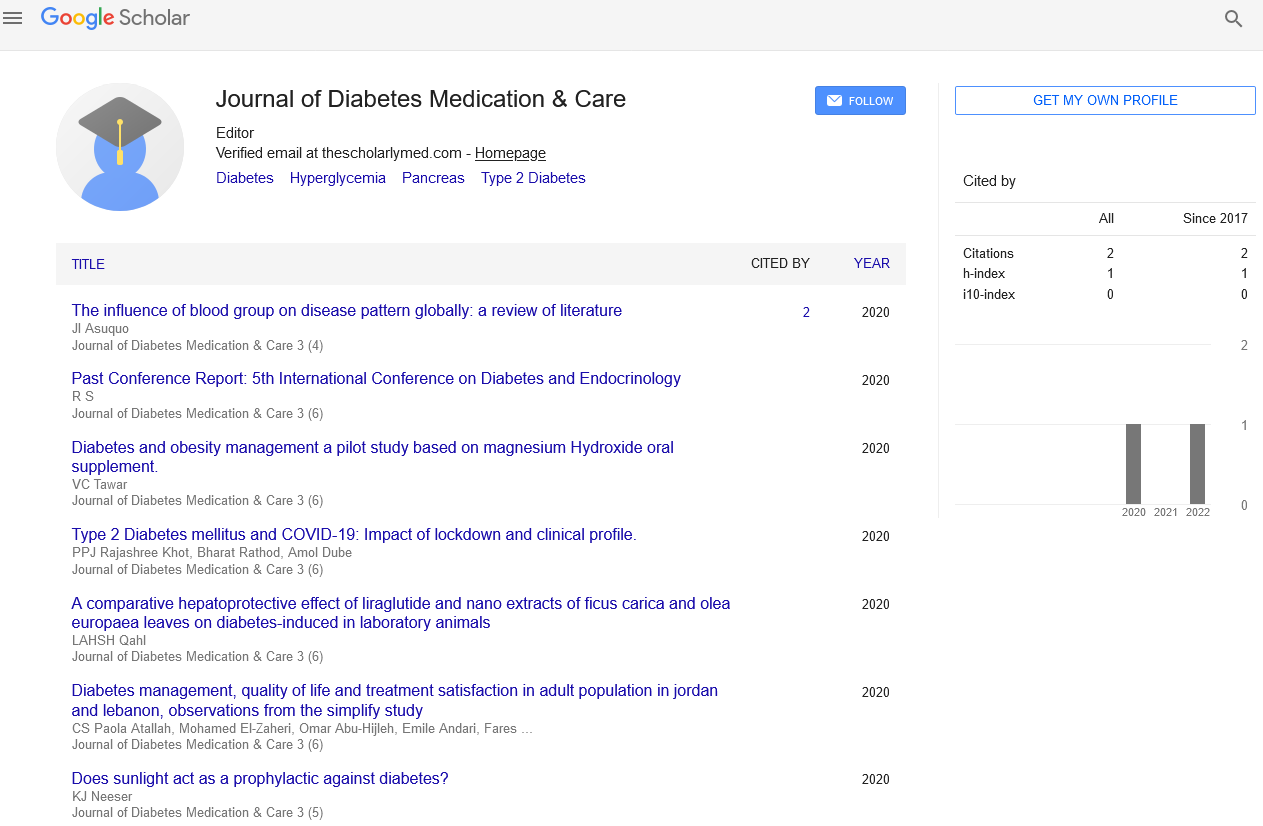Perspective - Journal of Diabetes Medication & Care (2023) Volume 6, Issue 6
Optimizing Diabetes Management: Unlocking Synergies in Combination Therapies
- Corresponding Author:
- Shobhan Aitwal
Department of Endocrinology, Chitkara University, Chandigarh, India
E-mail: shobhanaitwal@gmail.com
Received: 01-Nov-2023, Manuscript No. JDMC-23-120957; Editor assigned: 03-Nov-2023, PreQC No. JDMC-23-120957 (PQ); Reviewed: 17-Nov-2023, QC No. JDMC-23-120957; Revised: 24-Nov-2023, Manuscript No. JDMC-23-120957 (R); Published: 04-Dec-2023, DOI: 10.37532/JDMC.2023.6(6).146-147
Introduction
Diabetes, a chronic metabolic disorder characterized by elevated blood glucose levels, affects millions of people worldwide. The complexity of diabetes management often requires a multifaceted approach to achieve optimal outcomes. In recent years, the exploration of combination therapies has emerged as a promising strategy to address the intricate nature of diabetes. This article delves into the various facets of optimizing diabetes management through the synergistic effects of combination therapies, shedding light on the potential benefits, challenges, and future directions in this dynamic field.
Description
Understanding the complexity of diabetes
Diabetes mellitus, commonly referred to as diabetes, is a group of metabolic disorders characterized by elevated blood glucose levels. The two primary forms, type 1 and type 2 diabetes, differ in their etiology but share the common feature of insulin dysregulation. Type 1 diabetes results from the autoimmune destruction of insulin-producing beta cells, while type 2 diabetes is characterized by insulin resistance and inadequate insulin secretion.
Managing diabetes involves a comprehensive approach that includes lifestyle modifications, pharmacological interventions, and close monitoring of blood glucose levels. Despite advancements in treatment modalities, achieving and maintaining glycemic control remains a challenge for many individuals with diabetes.
The rationale for combination therapies
Monotherapy, the use of a single medication, has long been a cornerstone in diabetes management. However, the progressive nature of the disease often necessitates a transition to combination therapies to address multiple pathophysiological aspects simultaneously. Combining medications with distinct mechanisms of action can result in synergistic effects, providing better glycemic control and minimizing side effects associated with higher doses of a single agent.
Addressing insulin resistance and beta-cell dysfunction
Combination therapies often target both insulin resistance and beta-cell dysfunction, addressing the root causes of type 2 diabetes. For instance, combining metformin, which improves insulin sensitivity, with a Dipeptidyl Peptidase-4 (DPP-4) inhibitor, which enhances insulin secretion, can result in complementary effects. This synergistic approach helps regulate blood glucose levels more effectively than either medication alone.
Reducing cardiovascular risk
Diabetes is a significant risk factor for cardiovascular diseases. Combination therapies that not only control blood glucose levels but also address cardiovascular risk factors can have a profound impact on patient outcomes. Sodium-Glucose Cotransporter-2 (SGLT-2) inhibitors, which reduce blood glucose levels by promoting urinary glucose excretion, have shown cardiovascular benefits. Combining SGLT-2 inhibitors with other antidiabetic agents, such as Glucagon-Like Peptide-1 (GLP-1) receptor agonists, may offer a comprehensive approach to managing diabetes and its associated cardiovascular risks.
Challenges in implementing combination therapies
While the potential benefits of combination therapies are evident, several challenges must be addressed for their successful implementation in diabetes management.
Complexity and adherence issues
Combining multiple medications can increase the complexity of treatment regimens, leading to potential issues with patient adherence. Complex dosing schedules and an increased pill burden may contribute to non-compliance, affecting the overall effectiveness of the therapy. Healthcare providers must work collaboratively with patients to develop manageable treatment plans that prioritize adherence.
Safety concerns and side effects
The safety profile of combination therapies requires careful consideration. Drug interactions and additive side effects are potential concerns that must be thoroughly evaluated. Monitoring for adverse events and providing patient education on potential side effects are crucial components of a successful combination therapy strategy.
Future directions in combination therapies
The landscape of diabetes management is continually evolving, and ongoing research is uncovering new opportunities for optimizing combination therapies.
Personalized medicine approaches
Advancements in genetic and molecular profiling allow for a more personalized approach to diabetes management. Tailoring combination therapies based on an individual’s genetic and metabolic profile holds the potential to enhance treatment efficacy while minimizing adverse effects. Precision medicine approaches are likely to play a significant role in the future of diabetes care.
Innovative drug development
The pharmaceutical industry is actively engaged in developing novel antidiabetic agents with unique mechanisms of action. Exploring the synergies between these emerging therapies and existing medications could unlock new possibilities for optimizing diabetes management. Combinatorial approaches involving traditional oral agents, injectable therapies, and emerging technologies, such as gene therapies, may revolutionize the treatment landscape.
Conclusion
Optimizing diabetes management is a multifaceted challenge that requires a nuanced and adaptable approach. Combination therapies, with their potential to address diverse aspects of the disease, offer a promising avenue for achieving and maintaining glycemic control. Despite challenges related to complexity, adherence, and safety, the continuous evolution of treatment strategies, coupled with personalized medicine approaches and innovative drug development, holds the key to unlocking the full potential of combination therapies in diabetes care. As research progresses and new therapeutic options emerge, the synergy of combination therapies may reshape the future of diabetes management, providing hope for improved outcomes and enhanced quality of life for individuals living with this chronic condition.

